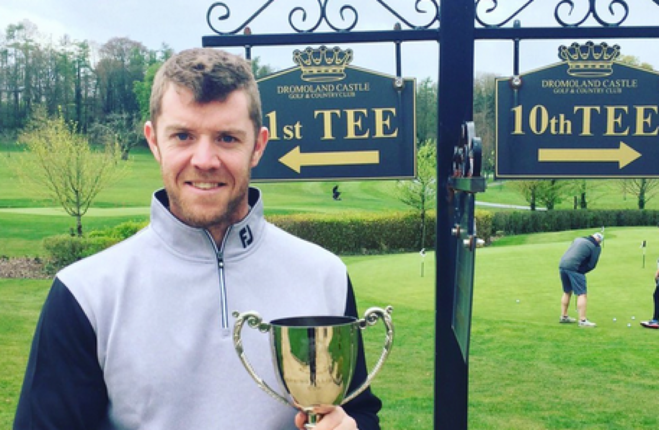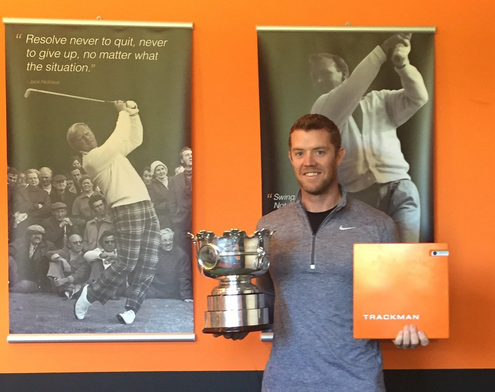BETWEEN THEM, PADRAIG Harrington and Louis Oosthuizen have won four Major Championships and have five more top-five finishes in golf’s fab four to their name.
They are also both winners of the Irish Amateur Open, with Harrington coming out on top in 1995 — the first time since 1960 the tournament was held — and the South African winning in 2002 at the age of just 20.
At 35, it’s unlikely that Peter O’Keeffe will be challenging for Major honours anytime soon, but that doesn’t mean his achievement in winning the same event at Royal County Down last week is any less remarkable.
O’Keeffe’s is a career of ups and downs, of highs and lows, but it is also a testament to how far perseverance, strength of mind and, of course, exceptionally good golf can get you.
“I’m still kind of floating actually, but I can feel myself crashing a small bit,” O’Keeffe told The42 after his win.
“I drove down last night and just went home and chilled out. I got up this morning at 5.30am to try and reply to as many messages as I could.
“It was unbelievable but it was all positive support and there have been plenty of days when I’ve been getting hard luck messages, so it’s great.”
Those hard luck messages mostly came during a six-year stint as a professional on the Challenge Tour, Europe’s secondary competition living up to its name for the 6’5″ Cork man.
“I went to Tour School as an amateur and got through that process to the final stage and, out of nowhere, I ended up with a Challenge Tour card in 2007.
“The expenses on the Challenge Tour and the European Tour wouldn’t be vastly different week to week but the prize money is only a portion of what’s available on the main Tour.
“On any given week, the scoring might be similar on both tours, but one guy is going away with €300,000 and the other guy is taking home €30,000 having played very similar golf.
“For me, it was financially difficult, I didn’t have the proper structure to run myself as a business. I was working and struggling to get sponsorship but it didn’t allow me to plan seasons or go practise in the winter.
“Ultimately, I didn’t like the idea of asking people for money and so I decided to stop.”
Even to this day, O’Keeffe is asked about whether or not turning professional is worth the risk. He says, as with a lot of things in life, it all comes down to cash.
“I get asked a lot about what I think about guys turning pro but, if you don’t have a huge pile of cash behind you, it’s very, very hard to pull this off because not every week is going to go your way.
“It might cost you €1200 to run yourself for a week, but if you don’t win anything you’re down money and if the reserves aren’t there, then you’re going to run out of money very quickly.”
But, for O’Keeffe, dropping off the Challenge Tour would see his life come full circle.
“I went on a golf scholarship to the States when I was 20. I was an Irish youth international at the time and thought I was a pretty handy player but I quickly found out I was miles off the pace.
“So I had to work really hard over there and came back a much better player.
“It’s funny the way things have come around. I did exercise science in college and I never thought I’d use it but now I’m in a partnership that owns three gyms — Dennehy’s Health & Fitness – in Cork and I do a lot of golf fitness coaching myself in there.”
And he’d recommend the scholarship approach to any young golfer.
“If there are any young people who think they want to be professional golfers, I think the American experience is a great way to do it.
“You find out not only if you like to be away from home, but also if you like the pressure of constant tournament golf.
“Provided you go to the right college, you’re going to improve.”
O’Keeffe started playing golf when he was 11, but didn’t really take it seriously until he was 16 or so as he was still playing other sports at the time. It’s something he recommends parents encourage in children who show golfing promise.
“I don’t mind kids starting young but I would be a huge advocate of playing other sports too. I think it’s extremely important.
“The best players that I see are athletic, they’re sporty in general and I think the mistake parents make is to restrict their child to one sport.
“Of course, if it comes to a point when you’re excelling at one sport, especially in golf, then you have to take different view on the situation.
“I see a lot of people who come to me and they’re playing, for example, rugby and golf and they might be on a Munster team and you tell them it’s maybe time to choose then.
“But up until then, athletic development is so important.”
So too is mental development and it’s a part of his game O’Keeffe says has developed with experience.
It came to the fore last weekend when a four-putt on the 15th threatened to derail his march to the title.
“It was not ideal,” he jokes.
“I was very good mentally all week, but you’re not going to play 72 holes on a tough golf course in wind without a trauma of some description.
“So if you prepare yourself that something bad might happen, when it actually happens, it’s not that big a deal.
“But experience definitely counts there. In years gone by, a bomb might have gone off in my head but I knew I hit decent putts on the green, I just hit them too hard. The green was a little quicker and I didn’t adjust for that.
“But I found out where I was in the tournament and I knew, with pars on the next two holes, I had a four-shot lead going down the last so I just kept patient.”
And that winning feeling, knowing he had such a cushion?
“We’ve all seen horror stories on the 18th over the years and I just wasn’t letting that happen.
“I knew I was cruising through 11 and 12 and I’d a nice putt on 13 when I knew I was in control.
“On 18 though, I stuck to the plan. I took on a tough tee shot, didn’t drop back to an iron or anything. I hit a nice second shot and, at that stage, I had 95 yards to go and a four-shot lead so I knew I was there.
“That was nice.”
The42 is on Instagram! Tap the button below on your phone to follow us!


